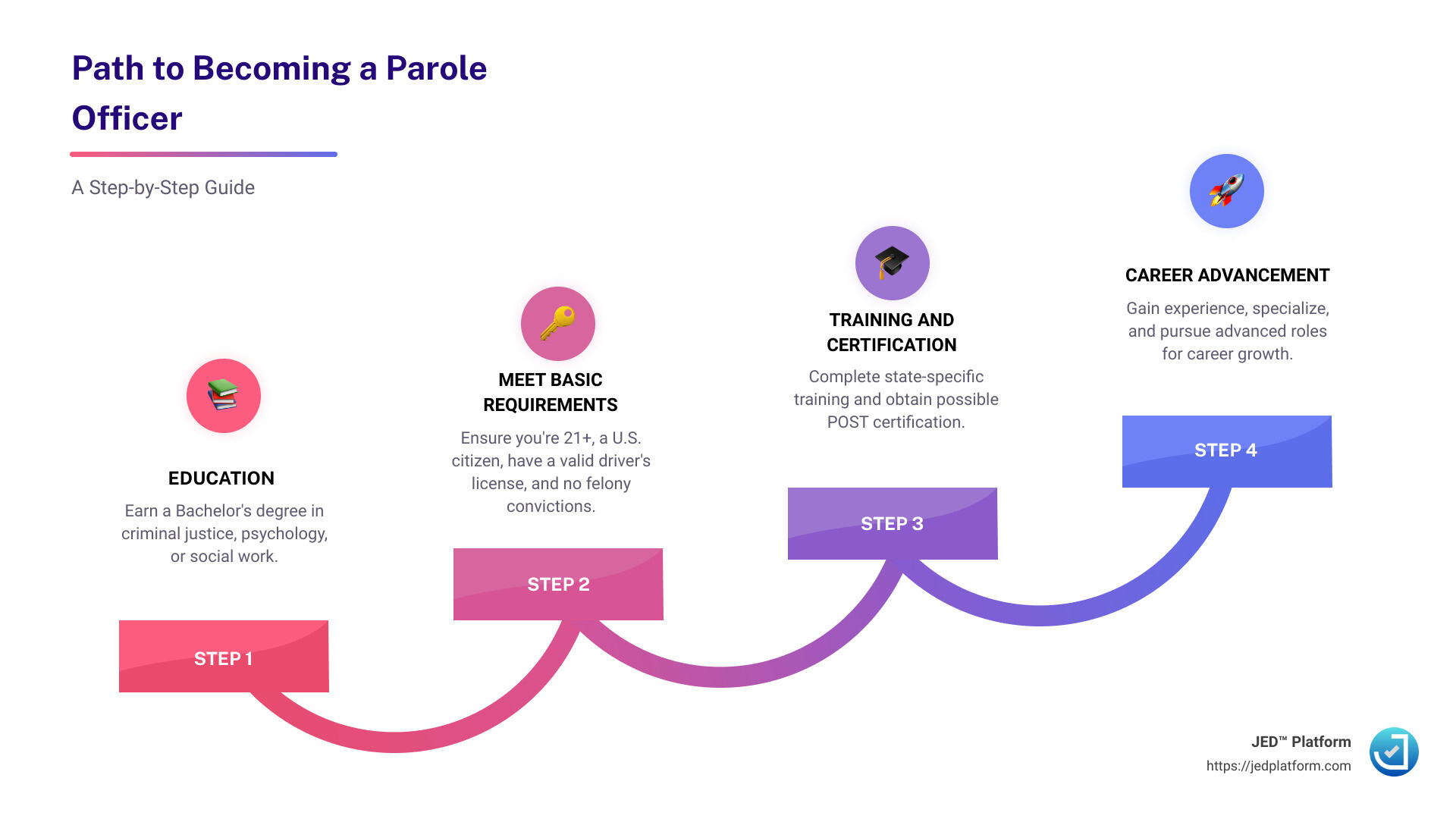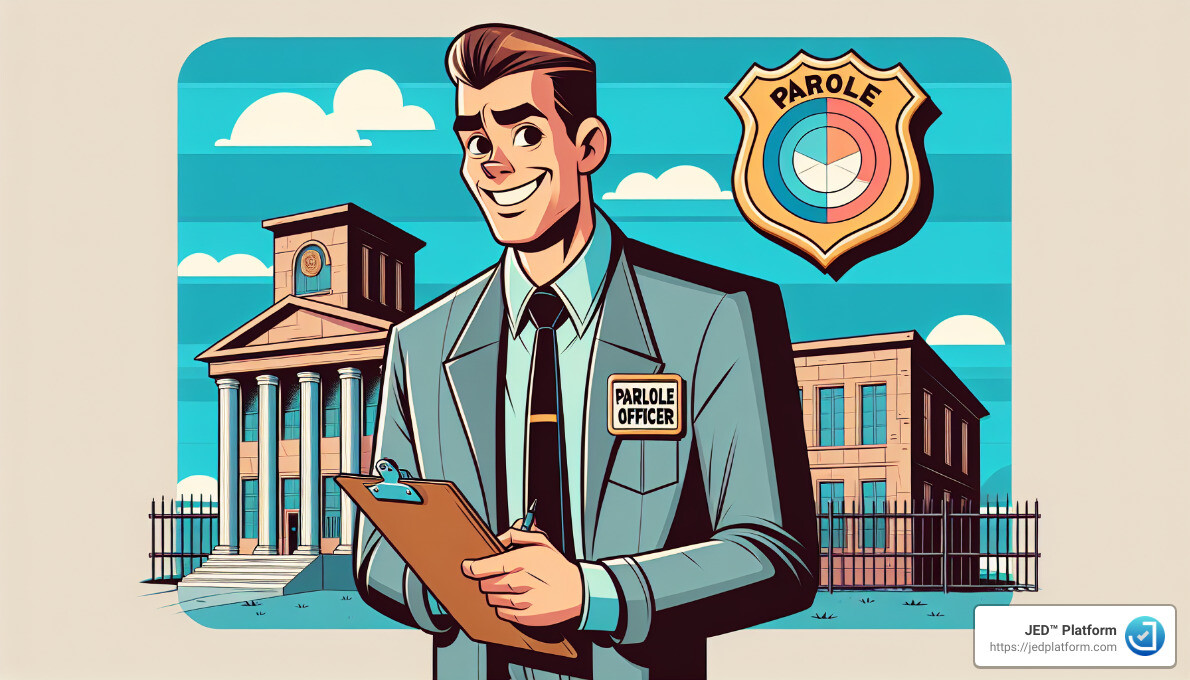All About Becoming a Parole Officer: An In-Depth Guide
Introduction
Thinking about becoming a parole officer? It’s a role that puts you at the heart of the criminal justice system, assisting individuals as they transition from incarceration back into society. Here’s a quick glance at what you need to know:
– Educational requirements: Bachelor’s degree in criminal justice, psychology, or social work.
– Age and citizenship: Must be 21 years or older and a U.S. citizen.
– Physical and legal qualifications: Valid driver’s license, no felony convictions, and possibly the ability to carry firearms.
– Training and certifications: State-specific training and possible POST certification.
Parole officers play a crucial role in public safety and the rehabilitation of offenders. Their mission is to supervise parolees, ensuring they comply with the terms of their release, and assist them in re-integrating into the community. This can include helping parolees find housing and employment, coordinating with treatment providers, and conducting regular check-ins.
The career path of a parole officer may start with an entry-level position but can lead to advanced roles through experience, additional education, and performance. Opportunities for specialization, such as working with specific offender groups like sex offenders or substance abusers, are available as your career progresses.

A career as a parole officer offers the chance to make a significant impact on individuals’ lives and the safety of communities. It’s a path that requires dedication, a strong sense of justice, and a commitment to rehabilitation and public service.
Understanding the Role of a Parole Officer
Responsibilities
At the heart of a parole officer’s job is the dual focus on rehabilitating parolees and ensuring community safety. These professionals play a critical role in the criminal justice system by supervising individuals who have been released from prison on parole. Their responsibilities include:
- Monitoring parolees to ensure they comply with the conditions of their parole.
- Connecting parolees with essential services such as housing, employment, education, and rehabilitation programs.
- Conducting regular check-ins, which may involve home visits, workplace visits, and random drug testing.
- Reporting progress to parole boards and making recommendations based on parolees’ behavior and needs.
Community Safety
Parole officers are the bridge between the parolee and the broader community. Their work significantly contributes to public safety by:
- Preventing recidivism through close supervision and support.
- Intervening promptly if a parolee is at risk of violating parole conditions.
- Working closely with local law enforcement and community organizations.
Supervision Techniques
Effective parole officers employ a variety of supervision techniques tailored to each parolee’s needs and risks. These include:
- Risk assessment tools to determine the level of supervision required.
- Electronic monitoring systems, such as GPS ankle bracelets, to track parolees’ movements.
- Behavioral contracts with clear expectations and consequences.
- Counseling and support groups to address underlying issues like substance abuse or mental health problems.
Investigation Procedures
Before a convict is released on parole, parole officers conduct thorough investigations to understand the individual’s background and potential risks. This process involves:
- Interviewing the offender, their family, and correctional officers.
- Reviewing the offender’s criminal history and behavior during incarceration.
- Assessing the offender’s readiness for reintegration into the community.
Through these investigations, parole officers gather crucial information that helps them create effective supervision plans tailored to each parolee’s needs.
A career as a parole officer is more than just a job; it’s a commitment to fostering safer communities and supporting individuals in their journey to reintegration. By understanding the complexities of this role, you are better prepared to embark on the path to become a parole officer, a path that promises both challenges and profound rewards in equal measure.
Educational Requirements
To become a parole officer, you need a strong educational foundation. This section will guide you through the necessary steps and preferred qualifications to start your career.
Bachelor’s Degree
At the core, a Bachelor’s Degree is essential. The field of study is important too. Most agencies prefer degrees in:
- Criminal Justice
- Social Work
- Psychology
These subjects provide a comprehensive understanding of the criminal justice system, human behavior, and social dynamics, which are crucial for a parole officer.
Preferred Qualifications
While the bachelor’s degree gets your foot in the door, some additional qualifications can set you apart:
- Master’s Degree: In some cases, especially for higher positions or federal agencies, a master’s degree in criminal justice or a related field can be a significant advantage.
- Internship Experience: Completing an internship in corrections or a related area can provide practical experience and exposure to the realities of the job.
- Specializations: Courses or certifications in areas like substance abuse counseling, mental health first aid, or correctional rehabilitation can enhance your skills and make you a more effective parole officer.
Why These Degrees?
- Criminal Justice: This provides a broad understanding of law enforcement, corrections, and the courts. It prepares you for the legal and procedural aspects of parole supervision.
- Social Work: This emphasizes rehabilitation and support, teaching you how to help parolees reintegrate into society successfully.
- Psychology: Understanding human behavior is key to managing and supporting offenders, making psychology a valuable field of study for parole officers.
The Bottom Line
Education is a crucial step to become a parole officer. It equips you with the knowledge, skills, and qualifications needed to perform this challenging but rewarding role effectively. By choosing the right field of study and supplementing your education with specialized training and experience, you can prepare yourself for a successful career in parole supervision.
In the next section, we’ll explore the state-specific requirements and training programs that will further shape your journey to becoming a parole officer.
State-Specific Requirements and Training
Georgia
To become a parole officer in Georgia, you must meet several specific requirements. First and foremost, you need to be a U.S. citizen and at least 21 years of age. A bachelor’s degree from an accredited 4-year college or university is also a must. The state doesn’t specify a required field of study, but degrees in criminal justice, social work, or psychology are often preferred.
Applicants must achieve an acceptable score on standardized tests such as the COMPASS, ASSET, SAT, ACT, or CPE. If driving is part of the job, having and maintaining a valid Georgia driver’s license is necessary. For male applicants between the ages of 21-25, registration with the Selective Service is required.
An interesting point for those already working within the state’s criminal justice system: if you’re a current POST certified State of Georgia employee who has passed the Criminal Justice test, you’re exempt from these testing requirements.
Training for parole officers in Georgia is rigorous. New hires must successfully complete an eight-week Peace Officer Standards and Training (POST) basic law enforcement course. This training covers a wide range of topics, from supervision techniques and investigation procedures to legal and ethical responsibilities, all aimed at preparing candidates for the complexities of parole work.

California
In California, the path to becoming a parole officer shares some similarities with Georgia but also has its unique aspects. Candidates must be either U.S. citizens or permanent residents and typically need to possess at least a bachelor’s degree. However, some positions may accept an associate’s degree, particularly if the candidate has considerable law enforcement experience.
California places a strong emphasis on law enforcement experience. Many parole officers in the state come from the ranks of the California Department of Corrections and Rehabilitation (CDCR). This experience provides valuable insights and skills that are directly applicable to parole supervision.
Like Georgia, California requires candidates to undergo comprehensive background checks and psychological exams to ensure they are fit for the role. A valid driver’s license is also a must due to the nature of the job.
Training in California is extensive, focusing on preparing officers to manage a variety of situations effectively. While specifics can vary, the training often includes courses on community supervision strategies, legal issues, and case management, equipping officers with the tools they need to support parolees’ successful reintegration into society.

In both states, the journey to become a parole officer involves meeting stringent requirements and undergoing comprehensive training. This preparation ensures that parole officers are ready to handle the challenges of the job, from supervising parolees to working closely with law enforcement and the community to maintain public safety.
As we delve deeper into the nuances of becoming a parole officer, it’s clear that dedication, a strong educational background, and a willingness to undergo specialized training are key. The next section will focus on the hiring process and career advancement opportunities for parole officers, highlighting the steps prospective candidates can take to achieve their career goals in this vital field.
The Hiring Process and Career Advancement
Entering the field to become a parole officer involves a series of steps designed to ensure that candidates are not only qualified but also prepared for the challenges of the job. Let’s break down these steps in simple terms:
Application
The first step is to apply. You’ll need to find a hiring agency and submit an application. This usually means filling out forms and providing documents that prove you meet the basic requirements, like your degree and citizenship status.
Background Check
Next comes the background check. Agencies want to make sure you’re trustworthy, so they’ll look into your past. This means checking for any criminal history, financial stability, and sometimes even your online presence.
Interviews
If your application and background check pass muster, you’ll be invited for interviews. Yes, that’s usually more than one. You might meet with HR, future colleagues, and even higher-ups. They’ll ask questions to gauge if you’re a good fit for the role and the team.
Training
Once hired, you’re not thrown straight into the deep end. There’s training—lots of it. Initially, you’ll undergo agency training which might include shadowing a senior parole officer, learning about arrest procedures, and even how to use lethal weapons safely. This job can put you in tough situations, and the agency needs to know you can handle them.
In-Service Training
Learning doesn’t stop after the initial training. Parole officers often receive ongoing training, or in-service training, throughout their careers. This can include updates on laws, new rehabilitation techniques, or specialized training for handling certain populations, like juveniles or sex offenders.
Advancement Opportunities
Career growth is definitely on the table. After gaining experience, you might move up to supervise other officers or specialize in a certain area, like community outreach or high-risk parolees. Some officers even advance to management roles, where they can influence policy and procedures.
A Real-Life Insight:
Consider the story of a parole officer who started in the field right out of college. Through dedication and continuous learning, they moved up to a senior position, where they now mentor new officers. Their journey underscores the importance of not just meeting the minimum requirements but embracing every learning and growth opportunity along the way.
Wrapping Up
The journey to become a parole officer is rigorous, but for a good reason. It’s a role that requires a keen understanding of both the law and human behavior, as well as the ability to handle potentially dangerous situations. The hiring process and subsequent career advancement opportunities are structured to build a workforce that’s not only skilled but also deeply committed to the mission of rehabilitating and supervising parolees.
Moving forward, let’s dive into the skills and qualities that can help you succeed and thrive as a parole officer.
Skills and Qualities for Success
To excel and become a parole officer, certain skills and qualities are essential. These traits not only help in effectively managing parolees but also contribute to personal satisfaction and career advancement in this challenging field.
Communication
Clear and effective communication is the cornerstone of a parole officer’s job. Whether it’s speaking with parolees, writing reports for the parole board, or liaising with other professionals, the ability to convey information accurately and persuasively is crucial. This includes both verbal and written communication skills.
Ethical Responsibility
Parole officers operate in scenarios that often present ethical dilemmas. Upholding high ethical standards and integrity is paramount. This means making fair decisions, respecting confidentiality, and always acting in the best interest of both the community and the parolees.
Physical Fitness
Though not always highlighted, physical fitness is important for parole officers. The job can be physically demanding, requiring officers to conduct home visits, and occasionally manage confrontations. Being physically fit ensures you can handle these aspects of the job safely and effectively.
Counseling
A significant part of a parole officer’s role involves providing guidance and support to parolees. Skills in counseling can be invaluable, helping officers to motivate and encourage individuals towards positive life changes. This requires patience, empathy, and the ability to listen and provide constructive feedback.
Legal Knowledge
A deep understanding of the criminal justice system, parole procedures, and relevant laws is essential. Parole officers need to be well-versed in legal terminology and processes to navigate the system effectively, make informed decisions, and provide accurate advice to parolees.
These skills and qualities form the foundation for a successful career as a parole officer. By focusing on developing these areas, aspiring officers can prepare themselves for the challenges and rewards of this vital role in the criminal justice system.
Frequently Asked Questions about Becoming a Parole Officer
What is the best degree for becoming a parole officer?
The best degree for becoming a parole officer typically includes fields like criminal justice, social work, or psychology. These areas of study provide a strong foundation in understanding the criminal justice system, human behavior, and the skills needed to work effectively with parolees. While a four-year college degree is a minimum requirement, having a master’s degree in criminal justice or related fields can give candidates a competitive edge.
What are the requirements to be a probation officer in Georgia?
To become a probation officer in Georgia, candidates must meet several key requirements:
- Be a U.S. citizen
- Be 21 years of age or older
- Possess a bachelor’s degree in criminal justice or a related field
- No felony convictions
- Sufficient physical fitness to perform professional duties
- 20/40 vision with or without correction
- Near normal hearing
Additionally, candidates must either be POST certified in the State of Georgia or have an acceptable score on standardized tests such as the ASSET, SAT, ACT, or CPE. A valid driver’s license is also required. Preferred qualifications include a master’s degree in criminal justice, law enforcement experience, and fluency in Spanish or Asian dialects.
What do you need to be on the parole board in Georgia?
To be on the parole board in Georgia, individuals must have extensive experience in the fields of private business, criminal justice, or legislature. The Georgia State Board of Pardons and Paroles consists of a five-member board, all appointed by the Governor. While specific educational requirements are not explicitly stated, having a strong background in criminal justice, law, or related fields, along with significant professional experience in managing, supervising, or making policy decisions related to criminal justice or corrections, is essential.
Moving forward, understanding the pathway to become a parole officer, including the educational and state-specific requirements, is crucial for anyone looking to pursue this career. The JED™ Platform offers resources and guidance for those interested in making a meaningful impact in the criminal justice system.
Conclusion
Choosing to become a parole officer is more than just selecting a career path; it’s about making a significant impact on your community and the lives of those looking to reintegrate into society. It’s a role that demands dedication, a strong sense of ethical responsibility, and a commitment to fostering safety and rehabilitation. As we’ve explored the journey towards becoming a parole officer, from the educational prerequisites to the nuanced state-specific requirements, it’s clear that this path is both challenging and rewarding.
At the heart of this journey is the desire to make a difference. Parole officers play a critical role in the criminal justice system, providing supervision, support, and guidance to parolees. This not only aids in reducing recidivism but also supports the successful reentry of individuals into the community. The skills and qualities developed through this career, such as effective communication, legal knowledge, and counseling, are invaluable and transferable to many areas of life and work.
For those passionate about pursuing this noble profession, the journey does not end with securing the position. Career advancement opportunities abound for those willing to continue their education and demonstrate exceptional dedication to their duties. The field of corrections is evolving, and with it, the role of the parole officer. Staying informed and engaged with the latest developments and training is key to success.
The JED™ Platform stands as a beacon for those navigating the complexities of the criminal justice system, whether you’re an aspiring parole officer, a professional seeking advancement, or someone interested in the broader implications of criminal justice reform. Our resources and programs are designed to support your journey, providing insights, guidance, and opportunities to connect with a community of like-minded individuals.
In conclusion, becoming a parole officer is a path filled with challenges, learning, and profound opportunities to impact lives positively. It’s a career that extends beyond the individual, touching the lives of families, communities, and society at large. We at the JED™ Platform are here to support you every step of the way, from exploring your initial interest in criminal justice to achieving your goals within the field. Together, we can contribute to a more just, equitable, and safe society.
Take the next step toward your future in criminal justice with the JED™ Platform, and transform your passion into a career that changes lives.

